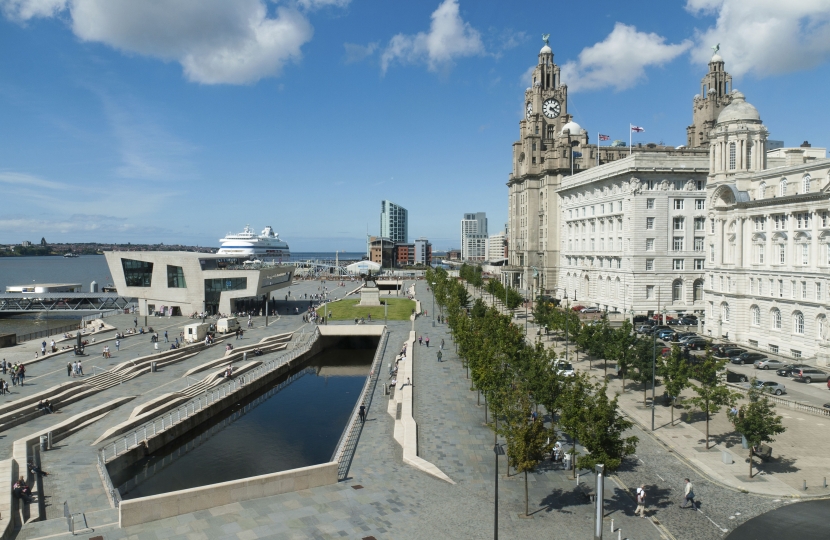
Our population is expected to increase by 10 million in the next two decades. Enough to populate greater Manchester three times over. The population density of our country will increase from 268 people per sq.km. To 305 people per sq.km. Germany by contrast has 229 people per sq.km and France 105.
Take a look at Sefton Council’s planning site and you will see that there are hundreds of houses being built on precious greenbelt land to accommodate this surge in the population and yet perfectly viable brownfield sites lie empty. But, where are these people going to find employment?
Liverpool City Region Growth Strategy aims to deliver economic growth and greater prosperity for residents and for generations to come. Research by Oxford Economics forecast that by adopting the growth strategy this approach could lead to:
- The creation of over 100,000 additional jobs by 2040
- A net increase of 20,000 businesses over the next 25 years
- An additional 50,000 people coming to live in the City Region by 2040
- Nearly doubling the size of the Economy to £50billion by 2040
But, what part will a Freeport play in this growth strategy?
Freeports provide special freedoms to trade, within a specific area around a major port. Freeport status supports the expansion of international trade by offering exemptions from certain operational, regulatory and customs requirements.
The simplified customs procedures and streamlined planning processes help to boost redevelopment and enhance existing industries and businesses. Within the Merseyside area we have a well-established infrastructure and workforce. These provide an essential platform for future training and employment opportunities.
The Freeport will provide inward investment opportunities and assist still further in developing supply chains regionally, nationally and internationally. Whilst some form of free zones could help with shaping export-oriented and place-based regional development programmes, there are important factors for policy makers to consider and mitigate against. We realise that they need to devise measures that counteract possible diversion of economic activity from elsewhere, and at the same time offer a wider set of incentives than just free zones.
The Merseyside area is well served by internationally renowned universities and training institutions, all of whom offer new and exciting courses for their students. The vision must be built on our core strengths and capacity for innovation to create a truly global and competitive City Region at the heart of the Northern Powerhouse. The creation of a Freeport must surely be an essential component for that to happen. Have we decided to hand over to other regions and other countries the employment opportunities in technology, engineering and manufacturing and thus miss the opportunities of showcasing our true “northern grit “ by embracing these exciting and ever developing opportunities?
The main issue with developing ports has always been the increase in traffic on the roads which serve the ports. This has not been overlooked within the Merseyside area.
Already an improved rail network is being constructed into Liverpool’s container port, by doubling the rail line into the port. The first phase of this is complete and the second phase will be completed in summer. Improvements to signals at Earlstown West are being incorporated into works associated with transferring the control of signals from Warrington to Manchester.
Planning and investigation activities are also being undertaken to utilise the Manchester Ship canal to help move freight from road to water. This work is being based upon the success that has been evident in the Netherlands . They too experienced issues with freight on their congested roads.
The key benefits of using this logistics model include:
Reduction of road congestion
It reduces emissions as the barges have engines comparable to trucks, but carry 10 to 12 times the amount of freight. Work is also being undertaken by the barge companies to reduce their emissions by developing alternative propulsion methods in the future. H2 batteries are being tested for efficiency in this respect.
ETA’s are known and achieved.
There is less chance of hazards than on the roads, or weather conditions impacting on delivery times. It is also cost effective and competitive verses road freight.
Improved use of underutilised transport systems.
The Manchester Ship Canal could be an essential artery for moving goods between Liverpool and Manchester and from hubs along the M6 and M60. It is a low carbon solution to deliver products directly into the North West and avoid road miles – helping businesses reduce on their transport costs and carbon emissions, whilst at the same time helping to reduce road congestion.
The Manchester Ship Canal is a vibrant trading hub supporting a diverse range of industries. The ship canal forms part of an innovative carbon efficient 'Green Highway' - helping businesses reduce costs, carbon emissions and remove congestion from the roads. We cannot afford to ignore its potential.

